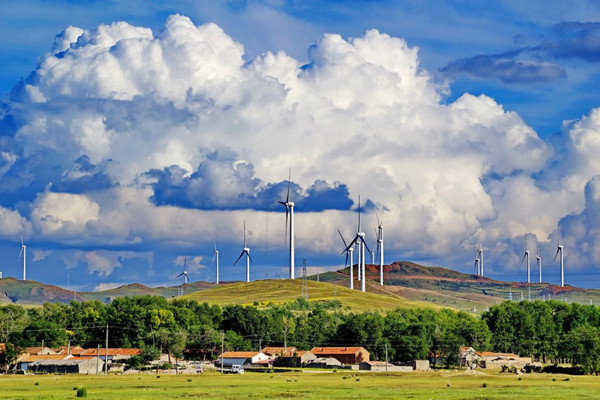
The file photo shows a wind power plant in Zhangjiakou, North China's Hebei province. [Photo/Xinhua]
China Southern Power Grid Energy Efficiency & Clean Energy Co Ltd, an energy-saving services provider that went public on the Shenzhen exchange in January, surged to 15.13 yuan ($2.31) per share in early trading on March 24 from its issue price of 1.4 yuan.
Albeit retreating of late, its share price was still as high as 13.29 yuan as of Monday's close, nearly ten times its Jan 19 issue price.
The entire decarbonization sector has also soared of late.
An index tracking 69 carbon neutral-related A shares jumped by 20.74 percent to 1048.82 by the end of March, while the CSI 300 index fell 5.4 percent to 5048.36, according to market tracker Wind Info.
Despite the dizzying nature of the surge, such a strong bourse performance points to a long-term trend of A-share shareholders loading up on green stocks amid a global rise in environment-themed spending, experts said.
Since China made a commitment in September to peak carbon emissions by 2030 and achieve carbon neutrality by 2060, eco-friendly investment has picked up steam in the country, they said. Detailed policies in this area announced at the two sessions in March, the country's most important policymaking platform, further stoked investor interest.
The Government Work Report delivered at the annual meeting of China's top legislative body vowed that the country will take a slew of measures to reduce carbon emissions this year, including accelerating the establishment of national markets for trading energy-use rights and carbon-emissions rights, and introducing special policies to encourage financial support for green and low-carbon development.
"We definitely see a lot of focus on renewable energy," said Thomas Fang, head of China global markets with investment bank UBS.
The electric vehicle supply chain has a lot more room to grow as the penetration rate in China is only 4 percent at present, said Fang, adding that demand for alternative energies such as solar, wind, nuclear or hydrogen is growing to shake the dominance of fossil fuels.
Wang Xiaoshu, head of the Asia-Pacific team of ESG Research at MSCI Inc, a major global financial indexes and analytics provider, said ESG investing-taking environmental, social and governance criteria as key standards to screen potential investments-is rapidly gaining traction in China amid regulatory pushes and capital market internationalization.
"It took nearly a decade for ESG investing in Europe and the United States to go from a niche concept to a mainstream practice. Our expectation for the Chinese and Asia-Pacific markets is that, though they took up the concept later, the mainstreaming of ESG investing may be completed at a faster pace within only three to five years," Wang said.
Some local fund managers have taken the initiative to align their practices with global ESG standards to attract foreign stakes, with some top fund managers in China having built up competent ESG investment and research ability, Wang added.
A CFA Institute report said that most major mutual funds in China have built separate or specific ESG research analysts or teams, while a survey conducted last year indicated that 98 percent of polled retail investors in the country have an interest in ESG investing.
Investment instruments to meet the growing appetite for environmental-themed investment are on the rise in China. Guotai Asset Management Co Ltd, for instance, launched an exchange traded fund that tracks an index made up by 50 A shares in the environmental protection sector in March.
A-share companies are becoming more open about their environmental efforts. According to data collected by asset management giant BlackRock, while ESG reporting is not mandatory in the mainland market, up to 85 percent of the CSI 300 companies have voluntarily issued ESG reports in 2020, compared to 54 percent in 2013.
Nevertheless, environmental-friendly investing is still in an early stage in the A-share market and awaits the establishment of more infrastructure to thrive, especially a common set of ESG disclosure standards for different companies that will lead to mandatory ESG reporting.
While the China Securities Regulatory Commission, the country's top bourse regulator, released revised guidance on A-share firms' investor relations management in February that added ESG information into the scope of communication with investors, experts expect the commission may require mandatory ESG reporting by A-share firms by 2022.
Jay Wang, China director of risk proposition performance at Refinitiv, a global provider of financial market data and infrastructure, said the expectation that China may make ESG disclosure mandatory by the end of 2022 "has some grounds", given that different market stakeholders are trying to formulate a set of ESG disclosure standards that is both suitable for Chinese firms and acceptable to global investors.